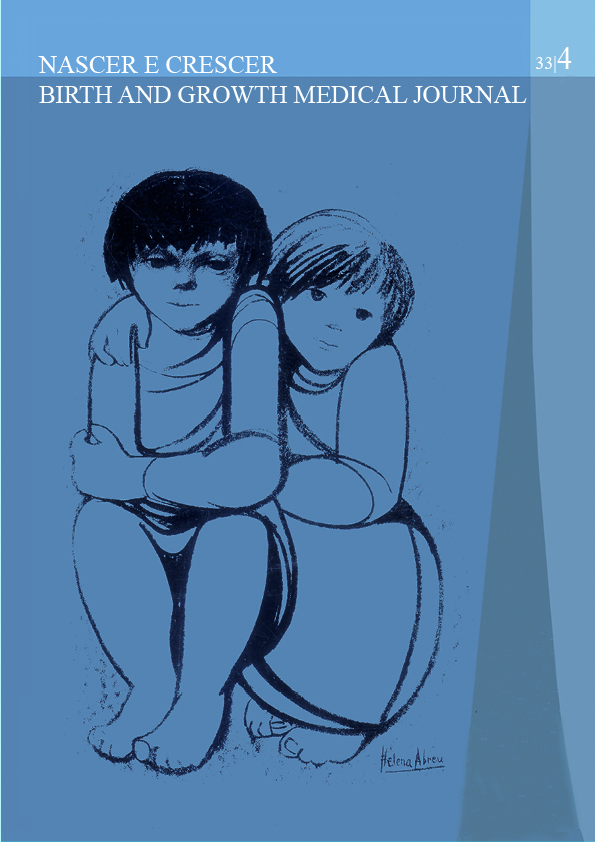Delusion, obsession, or both? – Clinical case
DOI:
https://doi.org/10.25753/BirthGrowthMJ.v33.i4.32898Keywords:
child and adolescent psychiatry, obsessive-compulsive disorder, psychosisAbstract
Introduction: Obsessions and delusions are part of a spectrum of irrational thoughts, with obsessions typically associated with insight and delusions characterized by a lack of insight. However, the concept of "obsessions without insight" has been incorporated into diagnostic criteria in recent years. This case report aims to explore the differential diagnosis between psychosis and obsessive-compulsive disorder (OCD) in an 11-year-old boy.
Case description: An 11-year-old boy was admitted to the Child and Adolescent Psychiatry Emergency Department for behavioral changes with four months of evolution. These changes included episodes of aggression toward his mother. In addition, the mother reported that he had developed an obsessive fixation on reading, refused to engage with any form of technology, and reacted angrily when his parents used electronic devices.
Conclusion: The overlap between psychotic symptoms and OCD-related symptoms is well documented in the literature and often complicates diagnosis and treatment. In this case, the lack of insight and positive therapeutic response to risperidone supported the diagnosis of psychosis over OCD.
Downloads
References
Nazeer S, Reddy A. Initial Presentation of OCD and Psychosis in an Adolescent during the COVID-19 Pandemic. Case Rep Psychiatry 2022. https://doi:10.1155/2022/2501926.
Bortolon C, Raffard S. Self-reported psychotic-like experiences in individuals with obsessive-compulsive disorder versus schizophrenia patients: Characteristics and moderation role of trait anxiety. Compr Psychiatry 2015; 57: 97-105. https://doi:10.1016/j.comppsych.2014.10.011.
Catapano F, Perris F, Fabrazzo M, Cioffi V, Giacco D. Obsessive–compulsive disorder with poor insight: A three-year prospective study. Prog Neuropsychopharmacol Biol Psychiatry 2010; 34(2): 323-30. https://doi:10.1016/j.pnpbp.2009.12.007.
Jacob ML, Larson MJ, Storch, EA. Insight in adults with obsessive–compulsive disorder. Compr Psychiatry 2014; 55(4): 896-903. https://doi:10.1016/j.comppsych.2013.12.016.
Poyurovsky M, Faragian S, Shabeta A, Kosov A. Comparison of clinical characteristics, co-morbidity and pharmacotherapy in adolescent schizophrenia patients with and without obsessive–compulsive disorder. Psychiatry Res 2008; 159(1-2): 133-39. https://doi:10.1016/j.psychres.2007.06.010.
Poyurovsky M, Zohar J, Glick I, Koran LM, Weizman R, Tandon R, Weizman A. Obsessive-compulsive symptoms in schizophrenia: implications for future psychiatric classifications. Compr Psychiatry 2012; 53(5): 480-83. https://doi:10.1016/j.comppsych.2011.08.009.
Scotti-Muzzi E, Saide OL. Schizo-obsessive spectrum disorders: an update. CNS Spectr 2016; 22(3): 258-272. https://doi:10.1017/S1092852916000390.
Schirmbeck F, Zink M. Comorbid obsessive-compulsive symptoms in schizophrenia: contributions of pharmacological and genetic factors. Front Pharmacol 2013; 4; 99. https://doi:10.3389/fphar.2013.00099.
Van Dael F, van Os J, de Graaf R, ten Have M, Krabbendam L, Myin-Germeys I. Can obsessions drive you mad? Longitudinal evidence that obsessive-compulsive symptoms worsen the outcome of early psychotic experiences. Acta Psychiatr Scand 2011; 123(2): 136-46. https://doi:10.1111/j.1600-0447.2010.01609.x.
American Psychiatric Association. Diagnostic and Statistical Manual of Mental Disorders 5th edition. Washington DC: American Psychiatric Association; 2013.
Oulis P, Konstantakopoulos G, Lykouras L, Michalopoulou PG. Differential diagnosis of obsessive-compulsive symptoms from delusions in schizophrenia: A phenomenological approach. World J Psychiatry 2013; 3(3): 50-6. https://doi:10.5498/wjp.v3.i3.50.
Fontenelle LF, Lin A, Pantelis C, Wood SJ, Nelson B, Yung, AR. Markers of vulnerability to obsessive-compulsive disorder in an ultra-high risk sample of patients who developed psychosis. Early Interv Psychiatry 2012; 6(2): 201-6. https://doi:10.1111/j.1751-7893.2012.00357.x.
Simpson HB, Foa EB, Liebowitz MR, Huppert JD, Cahill S, Maher MJ, et al. Cognitive-Behavioral Therapy vs Risperidone for Augmenting Serotonin Reuptake Inhibitors in Obsessive-Compulsive Disorder: A Randomized Clinical Trial. JAMA Psychiatry 2013; 70(11): 1190-9. https://doi:10.1001/jamapsychiatry.2013.1932.
Stein DJ, Koen N, Fineberg N, Fontenelle LF, Matsunaga H, Osser D, et al. A 2012 evidence-based algorithm for the pharmacotherapy for obsessive-compulsive disorder. Curr Psychiatry Rep 2012; 14(3): 211-9. https://doi:10.1007/s11920-012-0268-9.
Dold M, Aigner M, Lanzenberger R, Kasper S. Antipsychotic augmentation of serotonin reuptake inhibitors in treatment-resistant obsessive-compulsive disorder: a meta-analysis of double-blind, randomized, placebo-controlled trials. Int J Neuropsychopharmacol 2013; 16(3): 557-74. https://doi:10.1017/S1461145712000740.
Downloads
Published
How to Cite
Issue
Section
License
Copyright (c) 2025 Francisca Bastos Maia, Filipa Cordeiro, Vânia Martins Miranda

This work is licensed under a Creative Commons Attribution-NonCommercial 4.0 International License.
Copyright and Authors' Rights
All articles published in Nascer e Crescer - Birth and Growth Medical Journal are Open Access and comply with the requirements of funding agencies or academic institutions. For use by third parties, Nascer e Crescer - Birth and Growth Medical Journal adheres to the terms of the Creative Commons License "Attribution - Non-Commercial Use (CC-BY-NC)".
It is the author's responsibility to obtain permission to reproduce figures, tables, etc. from other publications.
Authors must submit a Conflict of Interest statement and an Authorship Form with the submission of the article. An e-mail will be sent to the corresponding author confirming receipt of the manuscript.
Authors are permitted to make their articles available in repositories at their home institutions, provided that they always indicate where the articles were published and adhere to the terms of the Creative Commons license.


